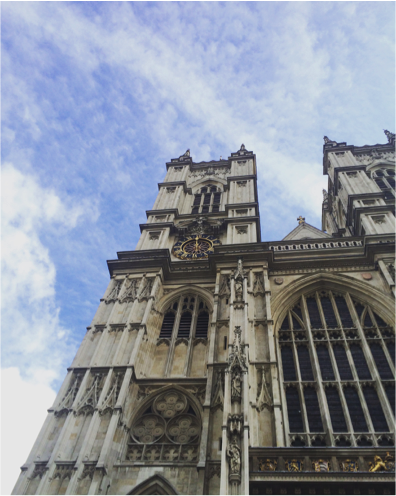Before this semester, I don’t know that I understood awe. You probably know that before it lost its deeper connotation, the word “awesome” meant something a little more like “daunting.” I get that now. When I get off the Underground at midday to see Big Ben gleaming over the spires of Parliament, or look out over the Thames from the London Eye, that’s awe — a breathtaking, heart-stopping kind of admiration that exhausts as much as it delights.
In September, I met an awesome God who speaks out of whirlwinds and waterfalls, the same who dared Job to tell what he knew. That God followed me into Westminster Abbey, where I’ve spent many an evening this semester. I admire the Anglicans and the way they understand the gravity of worshipping an almighty God. Central to their theology is the concept of God’s majesty, His divinity, His awesomeness. That resonates with me, so I keep coming back to Evensong services, listening to the choir’s music climb the air toward the vaulted ceiling.
The abbey itself is an awe-inspiring place: the site of every coronation in British history, the burial place of poets and queens. It’s impossibly old — consecrated in 1269 — and unspeakably beautiful. Sitting in Westminster and listening to the choir, I get to recapture the awe that I felt looking up at Skògafoss in Iceland. But there can be something cold and alienating behind that feeling, a sense of insignificance and invisibility. Awesome things stop me in my tracks, make me talk in hushed tones, demand to be photographed — but they never quite make their way into the deep places in my heart. They keep their distance.
When I look at the interior of my heart, I find that the moments taking up the most space are small, quiet comforts I took for granted until this semester: a good cry on my roommate’s shoulder, a rainy evening spent at Midnight Oil, the warm glow of Waffle House just before curfew. These sweet, humble gifts slip by almost unnoticed. They rarely ask to be tweeted or Instagrammed, and they often don’t even make for a good story. But when I’m frustrated and road-weary, I crave those un-extraordinary, familiar moments. I crave knowing and being known.
I guess I’m learning that awe, while valuable, can’t sustain us. At some point, awe burns out, and we’re left with a hunger for connection, for home. Maybe that’s what the church of England and I have both been missing in our approach to God. In our emphasis on reverence, we’ve forgotten love.
Two thousand years ago a man from Nazareth inspired awe in the people of Galilee, but he also reached into their hearts. He healed them not with whirlwinds and flashes of light, but with a touch of the hand and a tender word. In every moment of the Gospel, I see a God who deserves my reverence but offers me a deep and reciprocal love. This God doesn’t just reveal himself in waterfalls or cathedrals; He also appears in the smiles of friends, in cups of coffee, in comfort and trust and home.
“By this is love perfected with us, so that we may have confidence for the day of judgment, because as He is so also are we in this world. There is no fear in love, but perfect love casts out fear.” (1 John 4:17-18)
